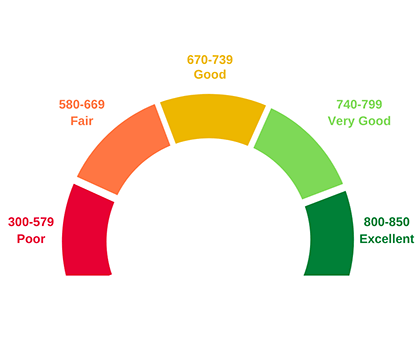How to fix your credit score from 400 to 800?

Improving your credit score from 400 to 800 is a significant endeavor that requires time, discipline, and responsible financial habits. While there is no quick fix, following these steps can help you improve your credit score over time:
Review your credit reports: Obtain copies of your credit reports from the three major credit bureaus (Equifax, Experian, and TransUnion). Carefully review each report for errors, inaccuracies, or fraudulent activity. Dispute any errors you find and work with the credit bureaus to have them corrected.
Pay your bills on time: Payment history is a crucial factor in determining your credit score. Make it a priority to pay all your bills on time, including credit card payments, loan installments, and utility bills. Set up payment reminders or automatic payments to help you stay on track.
Reduce your credit card balances: High credit card balances can negatively impact your credit score. Aim to keep your credit card utilization ratio (the percentage of available credit you're using) below 30%. Paying down your balances can have a positive effect on your credit score.
Pay off outstanding debts: Address any outstanding debts, such as collections or charge-offs. Develop a plan to pay off these debts, either through negotiation or by setting up payment arrangements with the creditors. Paying off or settling these debts can help improve your credit score.
Establish a positive credit history: If you have a limited credit history, consider opening a secured credit card or becoming an authorized user on someone else's credit card. Make small, regular charges and pay them off in full each month. This helps demonstrate responsible credit usage and can build a positive credit history over time.
Avoid new credit applications: Limit the number of new credit applications you make. Each application generates a hard inquiry on your credit report, which can temporarily lower your credit score. Only apply for credit when necessary and do your research to find the best options.
Maintain a diverse credit mix: Having a mix of different types of credit accounts (such as credit cards, loans, and mortgages) can positively impact your credit score. However, only take on new credit if it aligns with your financial goals and you can manage it responsibly.
Keep old accounts open: Closing old credit accounts may harm your credit score by reducing your overall credit history length. If you have old, unused accounts with no annual fees, it's generally better to keep them open. Use the accounts periodically to keep them active.
Manage your credit responsibly: Maintain responsible credit habits over the long term. This includes making timely payments, avoiding maxing out credit cards, and keeping balances manageable. Consistency in managing your credit will help build a positive credit history and improve your score.
Be patient and persistent: Improving your credit score takes time. Building a strong credit history and improving your score is a gradual process. Stay committed to responsible financial habits and monitor your progress regularly.
Remember, there are no shortcuts or quick fixes to improving your credit score. It requires a consistent effort to develop positive credit habits and demonstrate responsible financial behavior over time.
Comments
Post a Comment